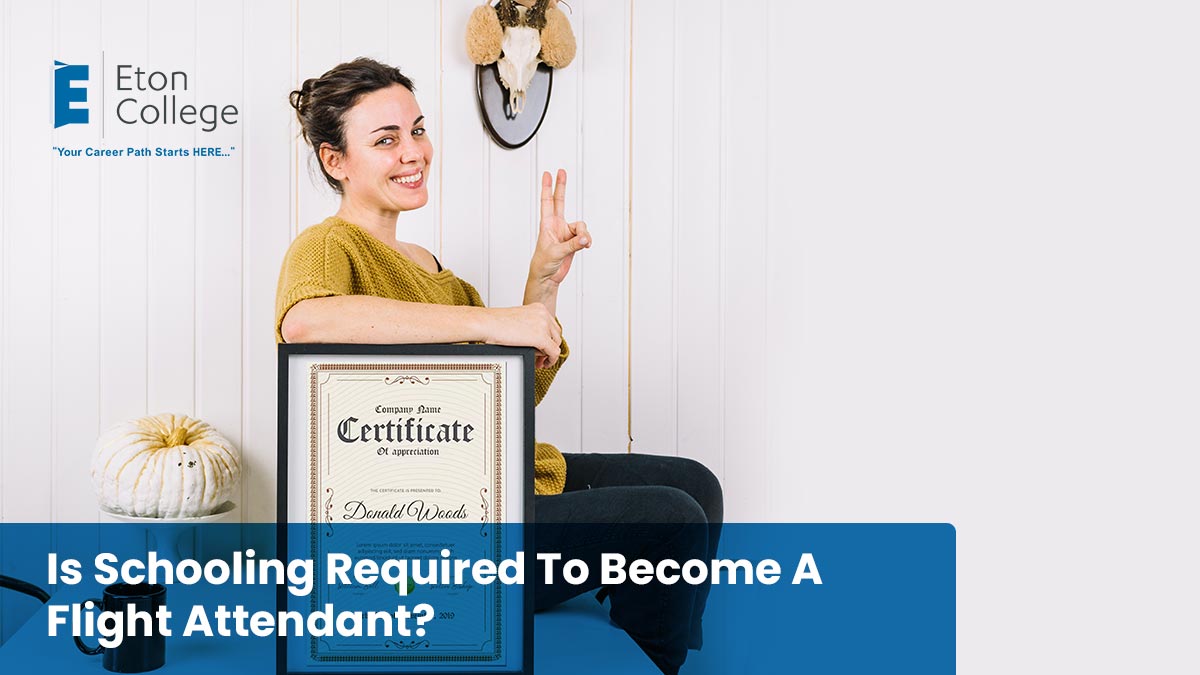- Flight attendants work in fast-paced, unpredictable environments, handling early mornings, late nights, and frequent travel.
- A significant part of the job involves interacting with passengers, requiring strong communication and problem-solving skills.
- The role requires physical stamina, including standing for long hours, lifting heavy items, and handling emergencies.
- Flight attendants must be open to flexible schedules, often working nights, weekends, and holidays, as well as spending time away from home.
- The ability to stay calm under pressure and adapt to various situations is essential for success in the role.
If you’re considering a career in aviation, one of the first questions you might ask is whether formal schooling is required to become a flight attendant. While there is no single educational path to follow, many airlines require candidates to complete some level of training or certification to meet industry standards.
Related:How Do You Switch Careers to Become a Flight Attendant?
In this blog, we’ll explore whether schooling is essential for aspiring flight attendants and what types of programs can help you stand out in this competitive field.
Educational Background Requirements
At the minimum, most airlines require candidates to have a high school diploma or its equivalent. While a diploma or GED is often sufficient to apply for flight attendant positions, formal training through a specialized program can significantly enhance your qualifications.
Flight attendant roles involve handling in-flight safety, managing customer service, and responding to emergencies, all of which require specific skills that aren’t typically covered in standard education.
Completing a specialized training program provides you with the knowledge and skills that airlines look for, such as safety procedures, first aid, and in-flight communication. These programs ensure that when you apply for a job, you’re already equipped to meet airline standards and handle the responsibilities of the role.
Training and Certifications
Though a highschool diploma might be enough to apply, many airlines prefer candidates who have completed formal training or certifications relevant to the job. In fact, most airlines provide their own in-house training programs after hiring flight attendants, but having pre-existing knowledge through a specialized program can set you apart from other candidates. These programs often include essential certifications such as First Aid, CPR, and AED (Automated External Defibrillator) training.
Related:5 Signs You’re Destined to Become a Flight Attendant
By enrolling in a flight attendant preparation program before applying, you’ll not only gain valuable skills but also make a strong first impression on potential employers. Training programs also focus on the development of communication skills, teamwork, and problem-solving, all of which are essential for flight attendants.
Do You Need College to Become a Flight Attendant?
Unlike other career paths, becoming a flight attendant doesn’t require a college degree. However, some candidates may choose to pursue post-secondary education in fields like hospitality, communication, or tourism to enhance their customer service skills and broaden their career options. A college degree can sometimes be an advantage when applying for certain airlines, but it is not a mandatory requirement.
Related:Want to Become a Flight Attendant? Breathtaking BC Islands to Visit During Your Studies
Ultimately, the most important qualifications for a flight attendant are the ability to manage safety, provide excellent customer service, and adapt to various situations. Specialized training programs focus on building these skills, making them more relevant than a traditional college education for this specific career.
The Importance of Formal Training Programs
While formal schooling isn’t necessarily required to become a flight attendant, attending a specialized training program is highly recommended. These programs are designed to cover all aspects of the job, from safety procedures to customer service. They also provide hands-on experience, such as live simulations and emergency drills, to prepare candidates for the real-life challenges of the job.
Related:Is 3 Months Enough to Become an Expert and Certified Flight Attendant in Canada?
Enrolling in a recognized flight attendant preparation program shows employers that you’re committed to the profession and ready to handle the demands of the role. It can also help you feel more confident when entering the workforce, as you’ll already be familiar with the responsibilities of the job and the expectations of airlines.
Conclusion: Is Schooling Necessary?
While schooling beyond a high school diploma isn’t mandatory to become a flight attendant, completing a specialized training program can significantly boost your chances of landing a job in this competitive industry. These programs equip you with the knowledge, certifications, and skills needed to excel in the role, giving you a head start on your career.
Related:Should I Drop Out Of University To Become A Flight Attendant?
Eton College offers a Flight Attendant Preparation Program designed to help aspiring flight attendants meet industry standards. With hands-on training, relevant certifications, and career support, Eton College can prepare you for a successful future in aviation.
FAQs
- What level of education is required to become a flight attendant?
Most airlines require at least a high school diploma or equivalent to apply for flight attendant positions. - Is a college degree necessary to become a flight attendant?
No, a college degree is not required to become a flight attendant, although some candidates choose to pursue higher education to enhance their skills. - Do I need to complete a specialized training program before applying for a flight attendant position?
While not mandatory, completing a flight attendant preparation program can improve your chances of securing a job and give you valuable skills that airlines seek. - What certifications are needed to become a flight attendant?
Flight attendants typically need certifications like First Aid, CPR, and AED training, which can be obtained through specialized preparation programs. - Does Eton College’s Flight Attendant Preparation Program offer career support?
Yes, Eton College provides career support, including resume building, interview preparation, and networking opportunities to help graduates transition into the workforce.
Related:Can You Become a Flight Attendant After Vocational Technical High School?





